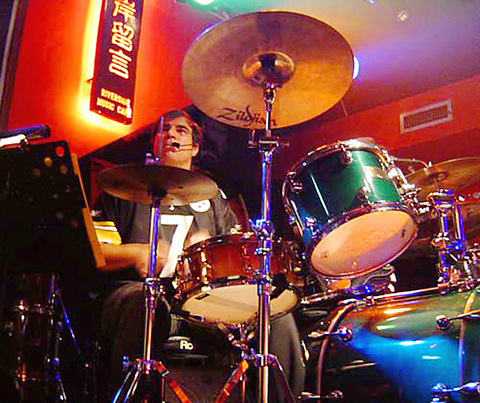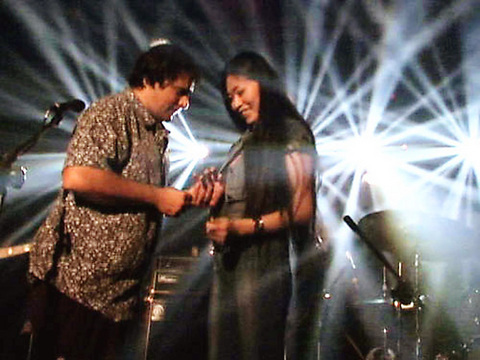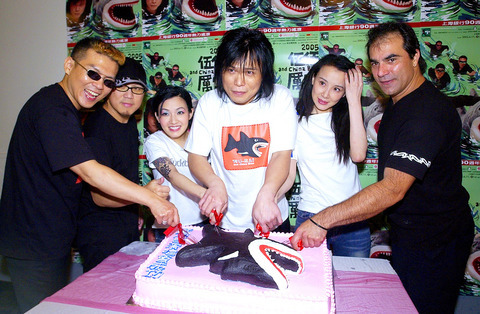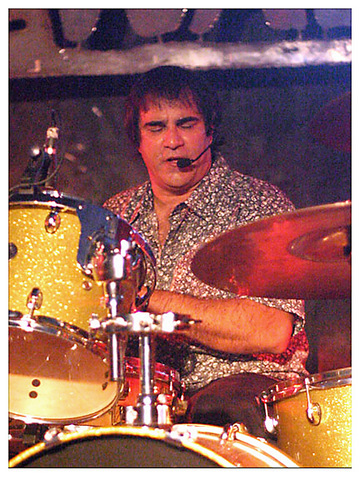"In the early days when I was in high school, I couldn't afford my own drum set, so the other kids who had drum sets had me come over and play." Dean "Dino" Zavolta, drummer for China Blue, speaks with the self-assured modesty and quiet confidence -- rare characteristics among professional musicians and rock stars -- of a man who rose from humble beginnings to make his living, a very good one, out of his passion.
The nation's "King of rock" Wu Bai (伍佰) and his band are revered by legions of fans across generations and countries in the Chinese-speaking world. Their
latest album Two Faced Man (雙面人) was nominated in this year's Golden Melody Award's Best Album category and their album The End of Love (愛情的盡頭) (1996) sold over 600,000 copies. That's just a snippet from a 15-year-old rock resume that would exhaust even the most avid reader.

PHOTOS: TAIPEI TIMES AND COURTESY OF DINO ZAVOLTA
Genes may have played a role in Zavolta's rise through the ranks of musicians; his father played drums, his mother sang and his uncle played guitar.
"My first band was ... a trio. I sang. We split up because I wanted to go out and do some professional work and earn some money. So I joined an oldies but goodies band, a 1950s and 1960s-style band playing The Drifters, The Temptations," Zavolta said.
On the side he made extra money working as a carpenter. He auditioned for a rock band that played covers, a gig that was to become professional. But originality beckoned and the third-generation Italian-American who was born in 1962 and grew up in California found a band to play showcases.

"We had to pay to play, and then the [venue] owner would give us a cut of the profits, off the door or whatever, and we would split it four or five ways. We were doing Orange County and I met No Doubt and Sublime," Zavolta said. "After I went to Taiwan these guys got big, they got into the mainstream. I had second thoughts: Maybe if I hadn't gone to Taiwan things would have been different."
Zavolta first came to Taiwan with a band called Motif on a six-month contract between 1988 and 1989. After his contract finished he returned to the US.
"Those six months were tough," Zavolta said. "I had a son, who was maybe one, two years old. The chick I was seeing got hooked up with drugs, and

totally disappeared. My Mom was faxing me telling me she didn't know where my son was. And I'm tripping out. I was in Taiwan on a contract and if I broke it all the guys in the band would have been out."
He won custody of his son, who moved to live with his grandmother so he could attend school.
All this happened "as I was getting off on the right foot, you know? Doing my drums," Zavolta said.

Taiwan had made a lasting impression, and Zavolta returned.
"It was quite hot; foreigners were coming here, joining and forming bands, there were a lot of clubs. You would go to the clubs around town and they'd all have good bands," Zavolta said.
The police turned up the heat, and began raiding clubs, searching for foreign artists performing without permits. It was then Zavolta decided to join a local band and "blend in."
Zavolta recounts his story matter-of-factly; there is no grand philosophical narrative, no dice with death, no tale of life pushed to the brink through drug abuse or drink binges, but it is neither hagiography nor squeaky-clean.
He looks the part, in the manner of American drummers, wearing bug-eyed shades and a cut-sleeve T-shirt on his well-built frame.
In the early 1990s, members of Zavolta's Magic band invited Wu Bai to tag along for a series of gigs.
"He still had his band going on at the time. He tagged along and we'd just do cover songs, Play That Funky Music, old pop that we liked to play. Every time we played at a club it would go belly up a week or two after. We felt we were cursed or something," Zavolta said.
The band's break came when Wu Bai worked on the soundtrack of Hsu Hsiao-ming's (
"We worked with him on that," Zavolta said. "The director liked Wu Bai's music and would come to our shows. He'd call his friends and before we knew it there'd be 500 people at the door."
As Wu Bai got off the ground, Bobby Chen (
Back in Taiwan the band built its own studio in Tienmu,
finishing construction within a couple of weeks.
"One of the lighting guys put a light too near the insulation and the whole thing went up,"
Zavolta said. "All our tapes and machines were burned up. My drums were covered in a
charcoal film. We borrowed equipment from friends and that's when we did our biggest selling album."
A series of record deals soon followed.
"We were with Magic Stone, a subsidiary of Rock Records. We still receive royalties from that. Now we are under our own label, Moonlight Records, which we set up last year. We are also with Avex."
Now China Blue and Wu Bai have a plush studio in Hsintien.
Political considerations intervened in the band's rise to stardom.
"We did The End of Love. The mainland started to get pissed off because we were playing for Chen Shui-bian (
After a string of hits, playing to packed concert stadiums in the US, Malaysia, Singapore and Hong Kong, which Zavolta describes as "better than sex," the band changed direction with Two Faced Man, adding an electronica layer to their sound.
"We listened to a lot of The Chemical Brothers and The Prodigy," Zavolta said. "It's a bit repetitive, but it's groovy."
Zavolta, along with China Blue bandmates Da Mao (
proposed to his girlfriend on stage at The Wall. She accepted.
"I can't sit around and wait for Wu Bai, for the next gig, this gig or that gig," Zavolta said. "We used to do shows every weekend.
"We're not as famous anymore. The new stuff is taking over, we are like the old cats now, we're the forefathers. A lot of young cats call me teacher [in Chinese], they love watching us play. ... We have a name for ourselves and we have a sound that no one can emulate. We are starting recording on our new album soon. And that should bring us back up again."

On April 26, The Lancet published a letter from two doctors at Taichung-based China Medical University Hospital (CMUH) warning that “Taiwan’s Health Care System is on the Brink of Collapse.” The authors said that “Years of policy inaction and mismanagement of resources have led to the National Health Insurance system operating under unsustainable conditions.” The pushback was immediate. Errors in the paper were quickly identified and publicized, to discredit the authors (the hospital apologized). CNA reported that CMUH said the letter described Taiwan in 2021 as having 62 nurses per 10,000 people, when the correct number was 78 nurses per 10,000

As we live longer, our risk of cognitive impairment is increasing. How can we delay the onset of symptoms? Do we have to give up every indulgence or can small changes make a difference? We asked neurologists for tips on how to keep our brains healthy for life. TAKE CARE OF YOUR HEALTH “All of the sensible things that apply to bodily health apply to brain health,” says Suzanne O’Sullivan, a consultant in neurology at the National Hospital for Neurology and Neurosurgery in London, and the author of The Age of Diagnosis. “When you’re 20, you can get away with absolute

May 5 to May 11 What started out as friction between Taiwanese students at Taichung First High School and a Japanese head cook escalated dramatically over the first two weeks of May 1927. It began on April 30 when the cook’s wife knew that lotus starch used in that night’s dinner had rat feces in it, but failed to inform staff until the meal was already prepared. The students believed that her silence was intentional, and filed a complaint. The school’s Japanese administrators sided with the cook’s family, dismissing the students as troublemakers and clamping down on their freedoms — with

As Donald Trump’s executive order in March led to the shuttering of Voice of America (VOA) — the global broadcaster whose roots date back to the fight against Nazi propaganda — he quickly attracted support from figures not used to aligning themselves with any US administration. Trump had ordered the US Agency for Global Media, the federal agency that funds VOA and other groups promoting independent journalism overseas, to be “eliminated to the maximum extent consistent with applicable law.” The decision suddenly halted programming in 49 languages to more than 425 million people. In Moscow, Margarita Simonyan, the hardline editor-in-chief of the